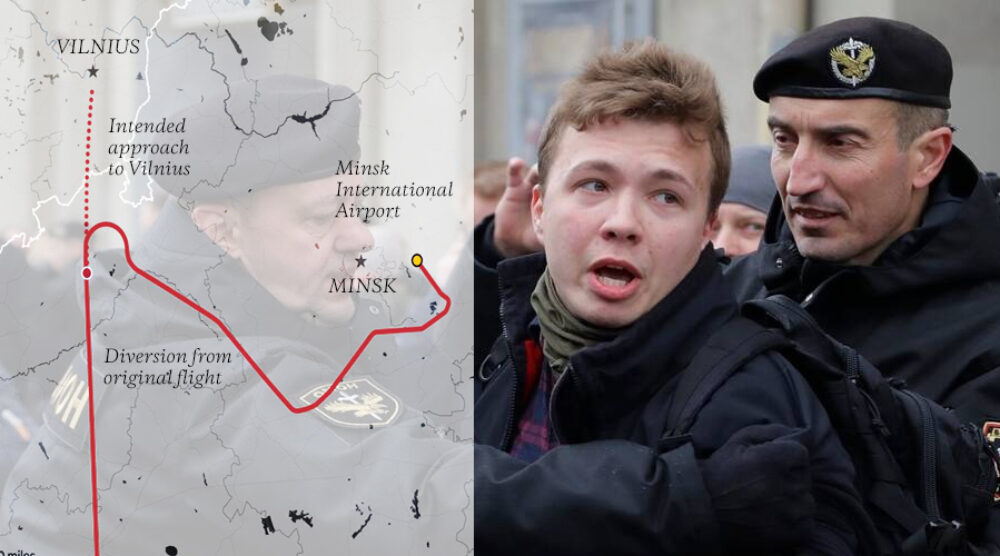The decision by Alexander Lukashenka’s autocratic government to force a Ryan Air passenger jet to land in Minsk – so that it could arrest Roman Pratasevic, the co-founder of the prominent NEXTA Telegram opposition group – showed just how committed the government in Belarus is to repressing dissent. But far from demonstrating Lukashenka’s strength the episode instead highlighted the weakness of sovereignty under the current regime. Increasingly dissociated from his own people, and facing a torrent of opprobrium from the international community, Belarus is now almost completely reliant on Vladimir Putin’s Russia to prop up its sclerotic dictatorship. And as events descended into high farce, Lukashenka’s façade of tough control revealed that Belarus is now little more than a Russian proxy, primarily useful to Moscow as a buffer zone, and to test Western responses to gross violations of international laws and norms.
The first test of sovereignty Lukashenka has failed concerns the expectation of commitments by states to uphold longstanding international agreements. Sending a Mig-29 to compel an airliner to land on its territory was a clear breach of the Montreal and Chicago Conventions, which regulate safe overflight by civilian aircraft. It is therefore not surprising that the episode has been labelled an act of state piracy and hijacking. It also sets a dangerous precedent that has made dissidents elsewhere fearful that the same tactics will be employed by Russia and China.
Lukashenka has also failed sovereignty’s legitimacy tests for internal and external audiences alike. Setting aside the rigged 2020 elections that saw him claim victory, force his opponents into exile, and brutally put down protests, his government’s claims of a Hamas bomb threat to the Ryan Air flight were swiftly exposed as fake. The emailed threat demanded a ceasefire in Gaza that had in fact begun two days earlier. It was sent after Belarus had told the Ryan Air flight to land. And it was sent to Belarus rather than Lithuania (where the aircraft was allegedly to have exploded), or to Greece where the flight had originated. The fact that four KGB agents left the aircraft along with Pratasevic and his partner also demonstrated that the episode was orchestrated by the government in Minsk.
Hence the only sense in which we can speak of Belarussian sovereignty is in its bleakest and most blunt context: a ruling central authority that controls the means of organised violence. But even on that score it is clear that Lukashanka is unable to act independently, in spite of his desire to engage in acts of transnational repression. Citing a confidential report by the Centre for Strategic and Foreign Policy Studies, a recent Atlantic Council analysis noted that Belarus lacked the ability to track opposition figures abroad, and that the involvement of Russian special services – not to mention foreknowledge by Russia’s air defence network, which is extensively integrated with Belarus – was highly likely.
Russia’s state-controlled media also swung quickly behind Lukashenka with talking points, adding to the suspicion that the event was coordinated. They included a level of vitriol unusual for even the most bellicose Russian commentators. The Russia Today correspondent in Minsk claimed that Pratasevic was ‘a scum, a punk, a freak, using explicit language to describe him, saying he must die’. And the head of the Belarussian KGB has suggested Pratasevic was a member of the Azov Battalion, which the Kremlin has labelled a neo-Nazi terrorist organisation, amid speculation that he could be handed over to pro-Moscow militants in Donbas for interrogation.
Regardless of the extent of Russian involvement in the arrest of Pratasevic, ostracizing Belarus from Europe serves the Kremlin’s broader strategic objectives. Lurching between East and West had previously been something of a hallmark of Lukashenka’s economic and foreign policy. But the Pratasevic episode, coupled to prior Russian support for Lukashenka following the chaotic 2020 protests, has put a stop to that. It has also come with inducements: Putin’s meeting with Lukashenka on a private yacht at Sochi included a new Russian US$500 million dollar loan to Belarus, and the bland statement that Russia was ‘not indifferent’ to the fate of Sofia Sapega, Pratasevic’s Russian partner who remains under arrest in Minsk.
The upshot of this is that Russian leverage over Belarus extends far beyond the notion of a ‘union state’ between sovereign equals. For some time Russia has been easily the biggest destination for Belarussian exports (at around 40-50% of total trade). Despite regular disputes over oil and gas pricing and transit fees, annual Russian subsidies for Belarussian businesses amount to around US$4 billion annually. The two nations are close security allies, with joint command activities held ahead of the annual major annual Russian Zapad exercises. And now the goal of bringing Belarus firmly into Russia’s orbit now includes elite capture as well. As Lukashenka himself put it when asked by Russian state TV if he and Putin were on the same team, ‘they pushed us tightly into one team for the rest of our life’.
Doubtless Lukashenka realises that being on Team Putin has its risks, which is why he has equivocated for so long. But the Pratasevic episode leaves him with few choices. It also leaves the EU and the broader transatlantic West, now mulling more sectoral sanctions to punish Minsk, with little option but to consider Belarus under its current leadership little more than a Russian satrapy. Ironically, in seeking to strengthen his control over Belarus, Lukashenka may well have weakened it even further.
Matthew Sussex is an Adjunct Associate Professor at the Griffith Asia Institute.








